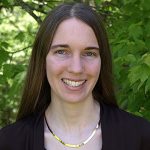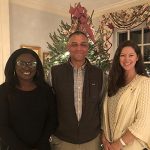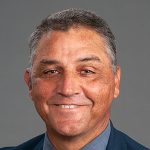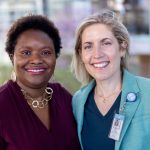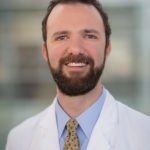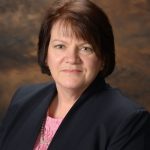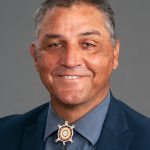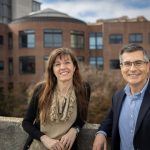My research focuses on a class of proteins called chemokine receptors. Many types of cancers will express these receptors, and this can contribute to cancer metastasis. While many drugs have been developed to block chemokine receptors, very few of these drugs have been effective in clinical trials. This is largely because these drugs must hold these proteins in an “off” position 100% of the time to be effective, which is a tall order. We propose to develop a new class of drugs that turn on pathways in cells that will degrade these chemokine receptors—making them “disappear” from cells entirely. We anticipate that this will be a more effective way to prevent these proteins from promoting metastasis than previous drugs that just try to keep chemokine receptors from being turned “on.” This proposal is early stage validation of a new strategy to drug chemokine receptors. However, in the long term, we hope that this work will ultimately improve cancer treatments in two ways. First, it could inspire both new classes of drugs that will block cancer metastasis. Second, it could provide new strategies to discover drugs with these unique properties.
State: North Carolina
Justin Milner, PhD
The immune system provides critical protection against cancer. In fact, new patient therapies designed to boost immune defenses (immunotherapies) have greatly improved cancer treatment. T-cells are a key component of the immune system that can protect against tumor growth. Notably, T-cells can be harnessed for use in cancer therapies in the form of ‘adoptive cell therapy’ (ACT). ACT is an exciting approach in which T-cells are administered to a patient to help fight cancer. Encouragingly, ACTs have successfully cured certain cancer types.
However, ACT does not work well for most cancers. In our work supported by the V Foundation, we will test new strategies to improve ACTs against pancreatic cancer, one of the most lethal cancer types. Completion of this project will yield two important outcomes: 1) Increase our understanding of how the immune system fails to control cancer, and 2) Provide important insight into enhancing the effectiveness of ACT in patients with pancreatic cancer. Immune-based therapies offer hope and promise to cancer patients were traditional treatment approaches (such as chemotherapy or surgery) have failed. This project funded by the V Scholar Program explores new opportunities to enhance cancer immunotherapies.
Stephanie Wheeler, PhD, MPH; Ronny Antonio Bell, PhD; Omotomilayo (Tomi) Feyisayo Akinyemiju, PhD
Funded by the 2021 Victory Ride to Cure Cancer
North Carolina (NC) has the largest American Indian population east of the Mississippi River. Yet, we do not know much about the health and health care of NC American Indians. Because cancer is the number one cause of death in NC American Indians, we need to better understand cancer and cancer-related needs in this unique population in order to reduce the cancer burden. Three NC cancer centers joined together in 2021 to partner and learn more about how to help American Indians with cancer. We also want to find and develop community resources for American Indians with cancer in North Carolina.
In this study, we will explore how cancer affects American Indians in North Carolina. First, we will measure the number of cancer diagnoses and deaths from 2003-2019. We will also learn more about how and where American Indians receive cancer care. These data will come from the North Carolina Cancer Registry and health insurance files. Second, we will ask tribal leaders to help us explore the needs and barriers to healthcare in American Indian communities. Finally, we will work with American Indian youth leaders to understand tribal community strengths and local resources that can help with cancer care.
This information will help American Indians by showing where the greatest needs lie and pointing to opportunities for better care, with a long-term goal of improving cancer outcomes in all American Indians.
Ronny Bell, PhD
Funded by the 2021 Victory Ride to Cure Cancer
Dr. Ronny Bell is a Professor in the Department of Social Sciences and Health Policy at the Wake Forest School of Medicine and Director of the Office of Cancer Health Equity at Atrium Health Wake Forest Baptist Comprehensive Cancer Center. Dr. Bell’s research focuses on disparities that impact health outcomes and health care access for racial/ethnic minority and underserved populations.
Carrie Lee, MD & Ashley Leak Bryant, PhD
Funded by the 2021 Victory Ride to Cure Cancer
Lineberger Comprehensive Cancer Center (LCCC) is committed to making cancer care accessible to the people of North Carolina. This includes opportunities to participate in clinical trials, which are important to improving cancer treatments. Few patients participate in clinical trials, and fewer still are patients who identify as Black, Indigenous, or a person of color (BIPOC). Many BIPOC patients are hesitant to participate in clinical trials. Enhancing diversity in our workforce will help BIPOC patients feel more comfortable enrolling in trials. This grant will provide opportunities for local BIPOC college students to learn about cancer care and research. The goal is to create interest in pursuing a career in this field at LCCC, and ultimately, ease hesitations that prevent BIPOC patients from participating in clinical trials. We will partner with NC Central University in creating a summer internship for 5 students. Students will be matched with mentors with experience in cancer research, clinical trials, and patient care. Students will also receive overall professional development such as resume and presentation development. To measure project success, we will encourage students to provide feedback during and after the program. A follow up survey will allow students to provide additional insights such as barriers to participation and measure their interest in a cancer related field. We will follow the students over time to understand the number that become employees at LCCC; we will also measure the number of BIPOC patients who enroll on clinical trials at LCCC.
Tomi Akinyemiju, PhD
Funded by the 2021 Victory Ride to Cure Cancer
Black patients are more likely to die from breast, prostate, lung, and colorectal cancers than White patients. There are many reasons for these differences, including barriers to accessing treatment. In recent years, scientists have created new and better treatments that match a cancer’s unique biology, changing the way that we treat the disease. The first step to getting these therapies is genomic testing, which looks closely at the cancer to understand what might be causing it. Black patients are less likely to get genomic testing and these new therapies than White patients. If we don’t improve access to genomic testing, Black patients will continue to experience barriers to life-saving treatments, causing even bigger differences in survival between Black and White patients. In this study, we will look at the factors that cause differences in genomic testing between Black and White patients. We will also interview Black patients and cancer doctors about their experiences and preferences related to genomic testing. We will use our results to create strategies to improve access to genomic testing for Black patients. In the future, we hope to use our strategies at Duke Cancer Institute and in community hospitals in the Duke Cancer Network to reach cancer patients who are mostly Black, rural, and low-income, a group with large barriers to genomic testing.
Sascha Tuchman, MD, MHS
Funded by the 2020 Victory Ride to Cure Cancer
African Americans develop a form of blood cancer called multiple myeloma more often than Caucasians. On average, African Americans live less long with it. That may be in part because African Americans take part in clinical trials less often. Clinical trials are studies designed to develop new treatment drugs. Those trials can sometimes help people to live longer with this illness. We are trying to improve how many take part in clinical trials at UNC. We are creating an easier, more comfortable doctors’ office to get care at and take part in trials at UNC. We are making it easier for African American researchers at UNC to work on this important issue. We will make a video that shows what clinical research is. It will show why it can be helpful to take part in research. The video will be shown to African Americans and other patients treated at UNC. The UNC team will compare how many African Americans join multiple myeloma trials before and during this grant. If more African Americans enroll in multiple myeloma trials after the grant begins, it would show that these efforts have helped solve this problem. That may help African Americans with multiple myeloma to live longer. IT will also help make important progress in this research.
Linda Sutton, MD
Funded by the 2020 Victory Ride to Cure Cancer
Cancer is caused by changes that happen in the genes of cancer cells. Special tests can find genes that start or promote cancer growth. New drugs can target cancer causing genes and kill cancer cells. The Duke project team wants to increase awareness and use of both the special tests and the new drugs. The project will bring a group of experts together to talk about patient cases and help find the best medicine for patients. If medicines are not available, the project team can find clinical trial options for patients. The team will also provide training to doctors and nurses on new tests for cancer genes and medicines. We will create information to help patients learn about the special gene tests and how the results can help the doctors choose the right medicine to treat their cancer. When the project is finished, the team hopes to provide the information and tools created to other local doctor’s offices and patients.
Ronny Bell, PhD
Funded by the 2020 Victory Ride to Cure Cancer
African Americans have the highest percentage of new cancer cases in the United States and the worst outcomes. Other diverse populations have difficulty getting to a cancer treatment center or need help figuring out the system one they arrive. Some people die from cancers that can be prevented or treated, simply because they are not aware of all of the treatment options. Cancer care can be very difficult because many times a patient has more than one doctor who is part of their care team. This can be scary and may make some people choose not to get cancer treatment, even if they can be cured. WFBCCC wants to make sure that everyone has access to the best cancer care possible. This may include patients participating in research that may improve outcomes for them but also may help provide information that can help tailor treatments for the next generation of cancer patients. It is important to make sure all populations are represented in studies that look at new treatments or supports for cancer patients. To meet that goal, we created a population health navigator program- people who are from the community who can help people learn about cancer, how to prevent it, what screening is required and what treatments are available. If someone is diagnosed with cancer, the navigator will assist that person by helping to remove barriers to care and will talk with patients about clinical research as part of their care.
Ian Davis, MD, PhD
Co-funded by the Dick Vitale Gala, and WWE in honor of Connor’s Cure
Years of cancer research have shown that combining therapies virtually always works better than when therapies are used alone. Recently, medications have been discovered that change the way genes are turned on and off. At the same time, treatments have been developed that use the body’s own cells to find and attack cancer cells. Each of these treatments have been shown to work alone on specific cancers. Each has known limits. However, the combination has not been studied. Our project explores whether combining these treatments will improve our treatments for childhood cancer. We are especially interested in if combining these therapies will increase the success of cellular therapies. Our proposal initially studies one specific medication that is already approved for use in children. We will also evaluate a large group of possible medications. We expect that our results will quickly result in a clinical trial for children. In addition, it may lead to a new treatment approaches for many cancers.

